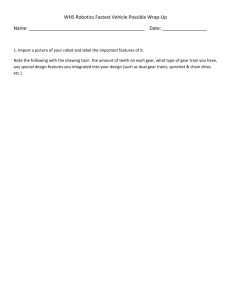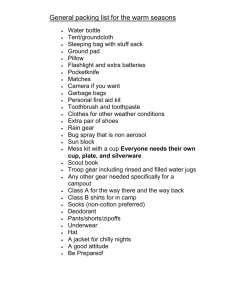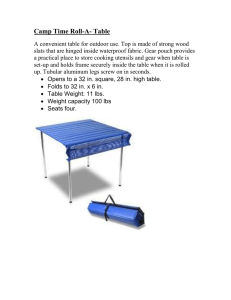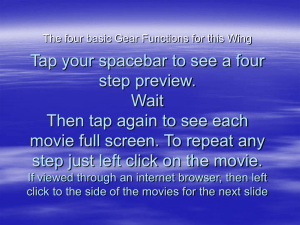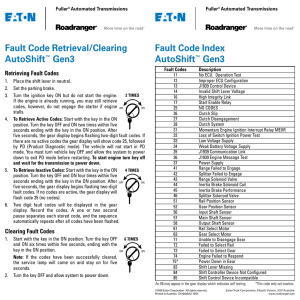Driver Instructions Fault Code Retrieval/Clearing
advertisement
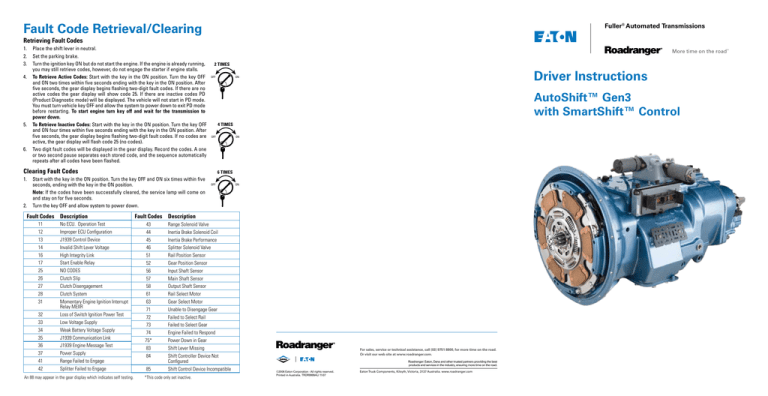
Fault Code Retrieval/Clearing Fuller® Automated Transmissions Retrieving Fault Codes 1. P lace the shift lever in neutral. 2. Set the parking brake. 3. Turn the ignition key ON but do not start the engine. If the engine is already running, you may still retrieve codes, however, do not engage the starter if engine stalls. 4. To Retrieve Active Codes: Start with the key in the ON position. Turn the key OFF and ON two times within five seconds ending with the key in the ON position. After five seconds, the gear display begins flashing two-digit fault codes. If there are no active codes the gear display will show code 25. If there are inactive codes PD (Product Diagnostic mode) will be displayed. The vehicle will not start in PD mode. You must turn vehicle key OFF and allow the system to power down to exit PD mode before restarting. To start engine turn key off and wait for the transmission to power down. 5. To Retrieve Inactive Codes: Start with the key in the ON position. Turn the key OFF and ON four times within five seconds ending with the key in the ON position. After five seconds, the gear display begins flashing two-digit fault codes. If no codes are active, the gear display will flash code 25 (no codes). 6. Two digit fault codes will be displayed in the gear display. Record the codes. A one or two second pause separates each stored code, and the sequence automatically repeats after all codes have been flashed. More time on the road 2 TIMES OFF AutoShift™ Gen3 with SmartShift™ Control 4 TIMES OFF Clearing Fault Codes 11 12 13 14 16 17 No ECU. Operation Test Improper ECU Configuration J1939 Control Device Invalid Shift Lever Voltage High Integrity Link Start Enable Relay 25 26 27 28 31 NO CODES Clutch Slip Clutch Disengagement Clutch System Momentary Engine Ignition Interrupt Relay MEIIR 32 33 34 35 36 37 41 42 Loss of Switch Ignition Power Test Low Voltage Supply Weak Battery Voltage Supply J1939 Communication Link J1939 Engine Message Test Power Supply Range Failed to Engage Splitter Failed to Engage An 88 may appear in the gear display which indicates self testing. ON 6 TIMES 1. S tart with the key in the ON position. Turn the key OFF and ON six times within five seconds, ending with the key in the ON position. Note: If the codes have been successfully cleared, the service lamp will come on and stay on for five seconds. 2. Turn the key OFF and allow system to power down. Fault Codes Description Driver Instructions ON OFF ON Fault Codes Description 43 44 45 46 51 52 56 57 58 61 63 71 72 73 74 75* 83 Range Solenoid Valve Inertia Brake Solenoid Coil Inertia Brake Performance Splitter Solenoid Valve Rail Position Sensor Gear Position Sensor Input Shaft Sensor Main Shaft Sensor Output Shaft Sensor Rail Select Motor Gear Select Motor Unable to Disengage Gear Failed to Select Rail Failed to Select Gear Engine Failed to Respond Power Down in Gear Shift Lever Missing 84 Shift Controller Device Not Configured 85 Shift Control Device Incompatible *This code only set inactive. For sales, service or technical assistance, call (03) 9751 8800, for more time on the road. Or visit our web site at www.roadranger.com. Roadranger: Eaton, Dana and other trusted partners providing the best products and services in the industry, ensuring more time on the road. ©2006 Eaton Corporation · All rights reserved. Printed in Australia. TRDR9999AU 11/07 Eaton Truck Components, Kilsyth, Victoria, 3137 Australia. www.roadranger.com TM Operation Operation Operation Driving the AutoShift “MAN” Manual Mode Driving Tips 1. Can be selected while moving or from a stop. The clutch is only needed at Start-up, when selecting a starting gear, and when stopping. “D”, “M” and “L” can be selected at any speed. Proper Start-up 2. Must use the lever to change gear, towards you for higher gears and away from you for lower gears. 1.Make sure neutral “N” is selected and the parking brake is set. 3. Shifter will “beep” if shift cannot be completed due to engine RPM and road speed. 2.Depress the clutch pedal and turn the ignition key to “On”. Wait for a solid “N” to appear on the gear display. 1. Can be selected while moving or from a stop. 2. Selecting “L” from a stop engages and maintains 1st gear. 3. Selecting “L” while moving will allow for downshifts only and downshifts will be performed at a higher RPM to maximize engine braking. Selecting a starting gear 1.Select “Drive” on the outer edge of lever by moving the selector slide to “D” or “L”. At this point you can also move the toggle switch to either “MAN” (Manual) or “AUTO” (Automatic) “R” Reverse Mode 2.Depress the clutch pedal. A solid number on the gear display indicates that the gear is fully engaged. If flashing down arrows appear on the gear display, this indicates that the input shaft has not slowed down enough to engage the gear. Continue to depress the clutch pedal until the down arrows are off. If the down arrows are off and the gear number continues to flash, slowly let up on the clutch pedal to fully engage the gear. 2. Transmission models with multiple reverses must use the lever to select other reverse gears. Remember to select the proper reverse gear for your load and grade condition. 4.Let out the clutch. AutoShift will automatically upshift and downshift in Drive “D”. When first starting up and after changing loads, AutoShift needs to adapt to the changing conditions of the vehicle. If the transmission holds a gear while in “D”, simply pull the lever towards you and the shift will be completed. This may have to be done several times before the transmission learns. “L” Low Mode 3.Start the engine and release the clutch pedal to register proper input shaft speed. If the AutoShift does not see input speed, it will not shift into initial starting gear. 3.Depending on how your vehicle is programmed, you can select different starting gears while in “D”, “MAN” or “AUTO” by moving the lever towards you for higher gears or away from you for lower gears. Remember to choose the correct starting gear for your load and grade. AutoShift will remember this starting gear until you select another starting gear or power the unit down. If the down arrows continue to flash after selecting a starting gear even after pushing the clutch pedal all the way to the floor and waiting several seconds, it means that the input shaft has not slowed down enough to engage the gear. This could be caused by a misadjusted clutch or a faulty clutch or clutch linkage. 1. Selecting Reverse from Neutral will engage Low Reverse and an “R” will appear on the gear display. 2 3. All reverse gears can only be engaged when the vehicle is stationary. Proper Shut Down Procedure 1. Remember to depress the clutch when stopping the vehicle. 2. Select Neutral and make sure a solid “N” appears on the gear display. 3. Set the parking brake. Illustration only. 4. Turn the key off and release the clutch pedal. NOTE: It is very important that you “do not” shut the truck off or stall the engine while the transmission is in gear. This will cause the transmission to lock in gear and the engine will not restart. 1. SmartShift Control 2. Forward Driving Mode Switch (slide switch) 3. MAN Switch Position 4. AUTO Switch Position 5.Upshift Direction (in manual mode, pull upward) 6. Reverse Selector Position 7. Mode Selector Switch 8. Neutral Selector Position 9. Drive Selector Position 10. Low Selector Position 11.Dowshift Direction (in manual mode, push downward) When AutoShift is downshifting in “D” it will not complete the shifts below a preset gear (normally 9th gear in an 18 speed transmission) and the vehicle will “coast down” until the driver gets back on the throttle. Manual Mode “M” should be used whenever you want to control the shifts, such as moving around the yard, going up a grade, or in poor traction situations. Low Mode “L” should be used anytime you want to maximize the engine brake such as going down a long grade, or when coming to a stop. AutoShift can activate the engine brake to make shifts faster. This can happen even if‑the engine brake dash switch is off. If a shift is required while in cruise, AutoShift will interrupt cruise while performing the shift and automatically re-engage cruise after the shift is complete. If AutoShift has detected a fault in the system you will see an “F” in the gear display. Note the conditions at which the fault occurred (hot/cold, wet/dry, on a grade/flat terrain) and get the vehicle to a service facility. Some faults will not allow the AutoShift to shift into other gears. You can try to reset the system by powering the system down for 5 minutes which may clear the fault long enough to get to a service facility. If the engine is shut off, stalls while in gear, or a dash “–” appears on the gear display after power up, perform the following procedure to try to get the transmission back into neutral: 1.Turn key “Off” and let transmission power down for at least 5 minutes. 2.Release parking brake and hold vehicle by using the brake pedal. 3.Depress clutch pedal but DO NOT push it all the way to floor making contact with the clutch brake. 4.Make sure shifter is in neutral. 5.Turn ignition key “On”. 6.Slightly release the brake pedal to let the torque off the driveline. AutoShift will attempt to shift into neutral. If neutral is achieved, the “N” will appear on the shift display and truck will start. NOTE: If the above procedure does not work, get the vehicle to a service facility.
